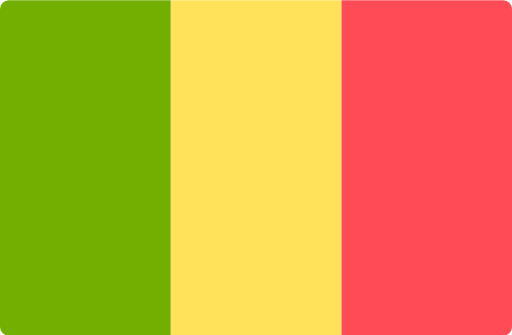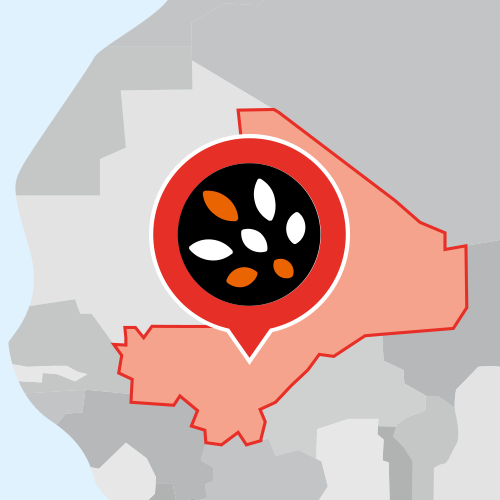
Capital: Bamako
Population: 22,5 million
45% of the population live below the poverty line
Life expectancy: 60 years
Areas of intervention: Food sovereignty, Gender and gender equality, Conflict prevention, Environment
HDI: 186th out of 191 countries
Literacy rate: 35 %
Contexte
Mali is located in West Africa, bordering Algeria and Mauritania to the north, Niger to the east, Burkina Faso and Ivory Coast to the south, and Senegal to the west. It is the second largest country in West Africa (with Niger being the first). Over 65% of its geography comprises deserts and arid areas.
Mali is particularly badly affected by the consequences of global warming. Arable land is becoming scarce, rainfall is becoming increasingly irregular, the desert is gaining ground and periods of drought are becoming longer. The repercussions are all the more important because of lack of access to water and poor local knowledge around how to apply good agricultural and ecological practices to limit desertification.
The population is made up of many ethnic groups all with different customs and languages. Most people live in rural, underdeveloped areas, with the desert areas to the East having just a small population density.
With a predominantly rural economy, Mali is one of the poorest countries in the world (ranked 186th in the HDI). The economic growth was around 5% in 2018. According to FAO estimates, the country has 41,201 hectares of cultivable land and the majority of the population (75%) work in farming. The poverty rate is extremely high, standing at 90% of the rural population according to World Bank figures.

A former French colony, Mali gained its independence in 1960. Since then, Mali has endured recurrent conflicts with chronic instability within its borders. 2019 was marked by numerous acts of war, including several mass massacres of civilian populations. Previously limited to the north, the area of instability continues to expand towards the centre of the country, which had previously been relatively unscathed. Against this tense background, Ibrahim Boubacar Keïta was re-elected for a second term.
Chronic insecurity and particular environmental and climatic conditions are major obstacles to the development of a country whose economy relies on agriculture.
Activities
Against this background, Secodev has chosen to concentrate its efforts on food sovereignty in the Bandiagara circle, Dogon. Measures include supporting farming structuring, and previously backing the construction and management of a dam for more efficient land use and improved access to water. A main aim is to implement and transmit good agroecological practices and techniques to promote development.
Support is given with growing sustainable food and vegetable crops to help the rural populations attain food security, while introducing farmers to new production and marketing methods, using varieties adapted to Dogon, such as shallots.


